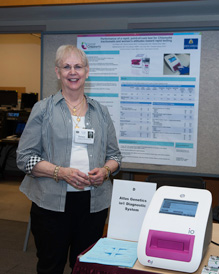Pioneer Dr. Charlotte Gaydos assists companies to build point-of-care (POC) technologies—technologies that bring care to the patient, rather than take the patient to care—improve public health around the world. Her interest in public health was sparked during a high school course, where she learned the basics of microbiology. This experience led her to complete a B.S. in medical technology and M.S. in medical microbiology from West Virginia University. During her first appointment at Johns Hopkins University (JHU) she became involved in an HIV research grant. As Dr. Gaydos was working on the HIV project she recognized a career in public health was her perfect fit. She went back to the classroom to add to her repertoire two additional degrees, an MPH and DrPH in Immunology and Infectious Diseases from JHU School of Public Health.
 As a Professor in the Division of Infectious Diseases of the JHU School of Medicine and the Director of JHU International STI, Respiratory Diseases, and Biothreat Research Laboratory, Dr. Gaydos describes her job as one of the best out there. Since 2007, Dr. Gaydos has been leading the Center for Point-of-Care Technologies Research for Sexually Transmitted Diseases funded by the National Institute of Biomedical Imaging and Bioengineering (NIBIB). The JHU Center has been a part of NIBIB’s Point-of-Care-Research Network (POCTRN) since its establishment.
As a Professor in the Division of Infectious Diseases of the JHU School of Medicine and the Director of JHU International STI, Respiratory Diseases, and Biothreat Research Laboratory, Dr. Gaydos describes her job as one of the best out there. Since 2007, Dr. Gaydos has been leading the Center for Point-of-Care Technologies Research for Sexually Transmitted Diseases funded by the National Institute of Biomedical Imaging and Bioengineering (NIBIB). The JHU Center has been a part of NIBIB’s Point-of-Care-Research Network (POCTRN) since its establishment.
As a Center director, Dr. Gaydos provides funds to new companies performing research on POC technologies. It can be difficult for companies to obtain funds without preliminary studies that culminate in positive data showing their technology is feasible. But, how do companies find the money to perform the preliminary studies? This is where Dr. Gaydos and her team step in and help provide the struggling companies with a small budget to get initial studies underway. Dr. Gaydos has also participated in over 42 FDA clinical trials and helps the grantees navigate the important regulatory considerations throughout the process of designing their study and technology.
After nearly twelve years of running the JHU Center, Dr. Gaydos still finds herself excited and committed to helping companies translate their promising POC technologies to clinics.
Dr. Gaydos described her main research focus as translating new diagnostics for sexually transmitted infections (STIs) and respiratory pathogens. Through this work she has published over 500 research articles and authored 29 book chapters. She conceptualized and launched the I Want The Kit Program which she views as her greatest accomplishment. The program delivers an STI testing kit to the door of women and men in Maryland, Washington D.C., and Alaska. Dr. Gaydos explained, “My goal is to remove the stigma around STI testing and get people healthcare in the privacy of their homes. Increasing POC testing in ways like this will positively impact healthcare.”
“As progress in gender and minority equality were made and continue, we start seeing the changes. I don’t believe women feel the same family pressures and discouragement to pursue a career in science as they did 30 years ago. Young girls are encouraged to go into science now. We are moving in the right direction,” Dr. Gaydos proclaimed.
Her advice for future women scientists is to pursue your passions. She feels if you love your job, it never feels like you are “working”. She finished by asserting, “Don’t be afraid to pursue what you want. Go for your dream!”

